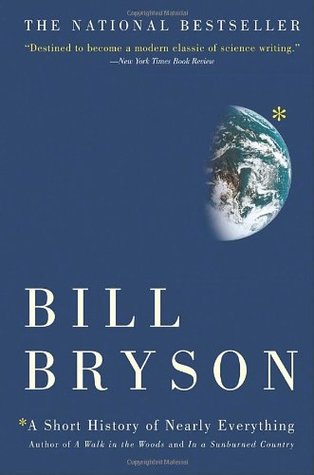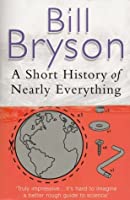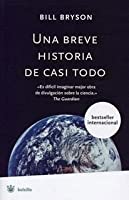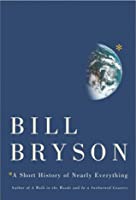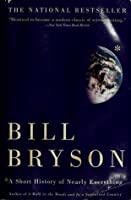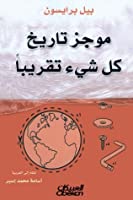5,884 books
—
8,378 voters
Goodreads helps you keep track of books you want to read.
Start by marking “A Short History of Nearly Everything” as Want to Read:
A Short History of Nearly Everything
by
In Bryson's biggest book, he confronts his greatest challenge: to understand—and, if possible, answer—the oldest, biggest questions we have posed about the universe and ourselves. Taking as territory everything from the Big Bang to the rise of civilization, Bryson seeks to understand how we got from there being nothing at all to there being us. To that end, he has attached
...more
Get A Copy
Paperback, First Trade Paperback Edition, 544 pages
Published
September 14th 2004
by Crown Publishing Group (NY)
(first published May 6th 2003)
Friend Reviews
To see what your friends thought of this book,
please sign up.
Reader Q&A
To ask other readers questions about
A Short History of Nearly Everything,
please sign up.
Popular Answered Questions
Travis Harshaw
People are to be respected, not their beliefs.
Community Reviews
Showing 1-30
Start your review of A Short History of Nearly Everything

A Short History of Goodreads
Surveys show that nearly 40% of all Americans believe the history of literature started in 2007, when Amazon sold the first Kindle; indeed, Amazon Fundamentalists hold it as an article of faith that Jeff Bezos actually wrote all the world's e-books over a period of six days. This is, of course, nonsense. It has been conclusively demonstrated that literature is far older than the Kindle; books already existed thousands of years ago, which were the direct ancestors of t ...more
Surveys show that nearly 40% of all Americans believe the history of literature started in 2007, when Amazon sold the first Kindle; indeed, Amazon Fundamentalists hold it as an article of faith that Jeff Bezos actually wrote all the world's e-books over a period of six days. This is, of course, nonsense. It has been conclusively demonstrated that literature is far older than the Kindle; books already existed thousands of years ago, which were the direct ancestors of t ...more

Good grief if I had even one textbook half this enthralling in high school, who knows what kind of impassioned -ologist I would have grown up to be. I hereby petition Bryson to re-write all curriculum on behalf of the history of the world.
I would run across things half-remembered from midterms and study guides and think, "You mean this is what they were talking about? You have got to be kidding me." It's never condescending, always a joy.
In fact, what I loved most is the acute, childlike sense o ...more
I would run across things half-remembered from midterms and study guides and think, "You mean this is what they were talking about? You have got to be kidding me." It's never condescending, always a joy.
In fact, what I loved most is the acute, childlike sense o ...more

Okay, so here's my Bill Bryson story. I was in The Gladstone, a public house not too far from this very keyboard, with my friend Yvonne, who will remain nameless. We had been imbibing more than freely. A guy approached our table and asked me in a sly surreptitious manner if I was him. Him who? Was I Bill Bryson? Now it is true that I bear a very slight resemblance
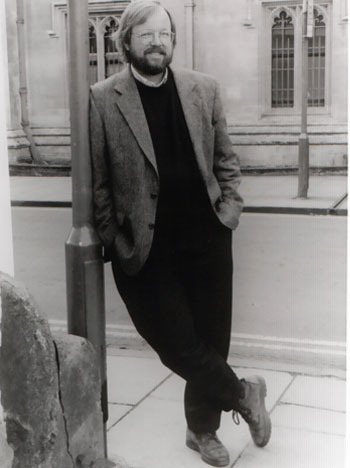
but you could also say that about Bjorn from Abba

and a zillion other white guys with beards and gently rounded fizzogs. Anyway, withou ...more

but you could also say that about Bjorn from Abba

and a zillion other white guys with beards and gently rounded fizzogs. Anyway, withou ...more

Nov 30, 2009
Grace Tjan
rated it
really liked it
·
review of another edition
Shelves:
general-non-fiction,
2009
What I learned from this book (in no particular order)
1. Phosphor was accidentally discovered when a scientist tried to turn human urine into gold. The similarity in color seemed to have been a factor in his conviction that this was possible. Like, duh. I’m no scientist, but shouldn’t it be obvious enough?
2. “In the early 1800s there arose in England a fashion for inhaling nitrous oxide, or laughing gas, after it was discovered that its use ‘ was attended by a highly pleasurable thrilling’. For ...more
1. Phosphor was accidentally discovered when a scientist tried to turn human urine into gold. The similarity in color seemed to have been a factor in his conviction that this was possible. Like, duh. I’m no scientist, but shouldn’t it be obvious enough?
2. “In the early 1800s there arose in England a fashion for inhaling nitrous oxide, or laughing gas, after it was discovered that its use ‘ was attended by a highly pleasurable thrilling’. For ...more

A Short History of Nearly Everything, Bill Bryson
A Short History of Nearly Everything by American author Bill Bryson is a popular science book that explains some areas of science, using easily accessible language that appeals more so to the general public than many other books dedicated to the subject.
Bryson describes graphically and in layperson's terms the size of the universe and that of atoms and subatomic particles.
He then explores the history of geology and biology and traces life from i ...more
A Short History of Nearly Everything by American author Bill Bryson is a popular science book that explains some areas of science, using easily accessible language that appeals more so to the general public than many other books dedicated to the subject.
Bryson describes graphically and in layperson's terms the size of the universe and that of atoms and subatomic particles.
He then explores the history of geology and biology and traces life from i ...more

Picked this up on audiobook when I was on tour and listened to it in my car.
I found it fascinating and informative. Kinda like a reader's digest version of the history of science. And even though I knew a fair chunk of what was mention, there was a lot of material I'd never even had a glimmer of before.
Fair warning: If you are prone to worry about, say, the end of the world. This probably isn't the book for you.
...more
I found it fascinating and informative. Kinda like a reader's digest version of the history of science. And even though I knew a fair chunk of what was mention, there was a lot of material I'd never even had a glimmer of before.
Fair warning: If you are prone to worry about, say, the end of the world. This probably isn't the book for you.
...more

Bryson's dead serious: this is a history of pretty much everything there is -- the planet, the solar system, the universe -- as well as a history of how we've come to know as much as we do. A book on science written by a non-scientist, this a perfect bridge between the humanities and the natural sciences. A course in the history of science should be mandatory for every teenager, and this should be the textbook.
Yes, it's a big, chunky book. No, it can't be trimmed down any further: when you're ad ...more
Yes, it's a big, chunky book. No, it can't be trimmed down any further: when you're ad ...more

Fascinating, interesting and filled with so much knowledge - A Short History of Nearly Everything is a very good read. Clearly Bill Bryson has done a lot of hard work and research. This book is one of the examples of how to learn, acquire knowledge, along with wisdom at the same time. The focus of the book is on learning lessons from history and the past, so that there's a better future.
This highly recommended book should be made part of the school syllabus. ...more
This highly recommended book should be made part of the school syllabus. ...more

The Written Review:Want a whirlwind worldwide romance adventure minus the romance? This is the book for you.
Big bois. Long bois. Extra extra page bois.
Everyone's heard of them. The Libraries are full of them. But are they worth it?
Click the link for my video review of the big bois in my life.
This book really does cover nearly everything. From the Big Bang to current life on earth, Bill Bryson does wonderful job of breaking down complex theories and concepts to their essential message:
Protons...more

Jan 02, 2013
Manny
rated it
really liked it
·
review of another edition
Recommends it for:
Anyone even slightly interested in science
Recommended to Manny by:
Leon Stirling
It's easy to nitpick A Short History of Nearly Everything. Bryson, by his own cheerful admission anything but a scientist, makes a fair number of mistakes. He says that all living creatures contain hox genes; he omits Alexander Friedmann and George Gamow from his description of how the Big Bang theory was developed; when talking about Darwin and Paley, he doesn't seem to be aware that Natural Theology was one of Darwin's favorite books and had a huge influence on him. Those are just a few of the
...more

A Short History of Nearly Everything is Bill Bryson's summation of life, the universe, and everything, a nice little easy-reading science book containing an overview of things every earthling should be aware of.
As I've repeatedly mentioned over the years, every time one of the casual-readers tells me I have to read something, like Harry Potter or the DaVinci Code, I dig my feet in deeper and resolve to never read it. This is one of the occasions I should have shaved a decade off of my stubbornne ...more
As I've repeatedly mentioned over the years, every time one of the casual-readers tells me I have to read something, like Harry Potter or the DaVinci Code, I dig my feet in deeper and resolve to never read it. This is one of the occasions I should have shaved a decade off of my stubbornne ...more

This is one of the most enjoyable books I have ever read. There, I said it
Bryson's book combines the best qualities of science writers like Attenborough, Diamond, Durrell, and Wilson; presenting the information with the wit he is most known for. It is an amazing achievement to condense the entire base of human scientific knowledge into 478 pages, but Bryson has done it. I completely agree with Tim Flannery, who writes on the jacket that "all schools would be better places if it were the core sci ...more
Bryson's book combines the best qualities of science writers like Attenborough, Diamond, Durrell, and Wilson; presenting the information with the wit he is most known for. It is an amazing achievement to condense the entire base of human scientific knowledge into 478 pages, but Bryson has done it. I completely agree with Tim Flannery, who writes on the jacket that "all schools would be better places if it were the core sci ...more

I was never any good at science. At the grammar school I attended we were shepherded into laboratories for lessons on physics, chemistry and biology. These were scary places; I’d never been anywhere like this before. The physics lab had gas taps and Bunsen burners and the walls were filled with incomprehensible charts. The chemistry lab held rows of specimen jars, more gas taps and burners and an underlying smell of something unpleasant and vaguely dangerous. The biology lab displayed pictures a
...more

Oh my gods, what a waste of perfectly good paper! I am flabbergasted that this has such consistently high reviews...
Three problems with this tripe:
1. falsity of the science (most blatantly around cosmology, but not limited to any one field) and misunderstanding of scientific principles;
2. a focus more on "biography" rather than on real "history";
3. trivial worthlessness of the information.
Number 1 is briefly chronicled below. Within just the first 20 pages or so, there are ridiculous factual er ...more
Three problems with this tripe:
1. falsity of the science (most blatantly around cosmology, but not limited to any one field) and misunderstanding of scientific principles;
2. a focus more on "biography" rather than on real "history";
3. trivial worthlessness of the information.
Number 1 is briefly chronicled below. Within just the first 20 pages or so, there are ridiculous factual er ...more

Well deserving of its popularity and praise, this book manages to be fun even though it contains a massive amount of information delivered at a rapid rate. The title is hyperbolic; this is an introduction to scientific building blocks that will give the reader a basic understanding about the world, our place within it, and of the history behind major scientific discoveries. Though it has the ability to make one feel overwhelmed, I think it has an equal potential to be a good kicking off point fo
...more

2.5 Stars
This is probably going to make me sound as thick as two short planks but I didn't like it, I knew going into this book that it was going to be a challenge as Science is not really my preferred bedtime reading but I do think its good to try new things but unfortunately yes this was just hard work for me and I struggled through this one.
But on the plus side I did learn some STUFF just dont ASK me to EXPLAIN it to you and it did encourage discussion with my Nerdy other half which cant b ...more
This is probably going to make me sound as thick as two short planks but I didn't like it, I knew going into this book that it was going to be a challenge as Science is not really my preferred bedtime reading but I do think its good to try new things but unfortunately yes this was just hard work for me and I struggled through this one.
But on the plus side I did learn some STUFF just dont ASK me to EXPLAIN it to you and it did encourage discussion with my Nerdy other half which cant b ...more

11/10 - a book everyone should read simply because of the knowledge it imparts to the reader.
This is one of those books where I realised after a few pages that I couldn't even plan to write this book, let alone put the words on to the page.
A stunning achievement and if I had to recommend one anecdote, it would be Edmond Halley (of comet fame) going to see Isaac Newton about the path the Earth follows around the sun.
Halley and Christopher Wren (in the time when he was a famous mathematician / ...more
This is one of those books where I realised after a few pages that I couldn't even plan to write this book, let alone put the words on to the page.
A stunning achievement and if I had to recommend one anecdote, it would be Edmond Halley (of comet fame) going to see Isaac Newton about the path the Earth follows around the sun.
Halley and Christopher Wren (in the time when he was a famous mathematician / ...more

A short history of nearly everything
This is a remarkable accomplishment. From the author, of course, but also from me, to have read it. I'm not a scientist, so when I started reading this book, I expected that I would skip some parts. But I didn't ; I read every single page of this highly readable and enjoyable book.
I won't bother you with all the scientific stuff I learned. Instead, I compiled a top 5 list of the frightful fates of some scientists.
1. Max Planck (1858-1947) was a German theore ...more
This is a remarkable accomplishment. From the author, of course, but also from me, to have read it. I'm not a scientist, so when I started reading this book, I expected that I would skip some parts. But I didn't ; I read every single page of this highly readable and enjoyable book.
I won't bother you with all the scientific stuff I learned. Instead, I compiled a top 5 list of the frightful fates of some scientists.
1. Max Planck (1858-1947) was a German theore ...more

What I appreciated most about this book is that it recognizes the lesser-known pioneers of our time. To be more precise, the book in large part, introduces and acknowledges some of the barely known Western scientists (along with the famous ones) that researched, discovered, and in part laid out the foundation for modern astronomy, geology, paleontology, chemistry, physics, biology, but never received the deserved recognition!
The author answers the questions, how and with whom, we arrived at the ...more
The author answers the questions, how and with whom, we arrived at the ...more

The best thing about this book is that it introduces other books you would like. It showed me that I should probably read more about Newton and Einstein, and that astronomy is something that I am still interested in. I did find myself scanning through certain sections because I already understood them well (the vastness of the universe) or I don't think I will ever understand them (complicated aspects of biology). Like all science book, they get outdated fast but this one is still holding up, at
...more

Aug 19, 2006
Otis Chandler
rated it
it was amazing
Recommends it for:
anyone curious about the world
A fascinating history of science. Ever curious how everything we know about the world came to be - read this! I loved reading about what old greats like Darwin thought about the world - they were all right about most things, but also very wrong about some things - makes you wonder how much we are wrong about today!
Another interesting piece was how many of the world's prominent scientists had the time to do their research because they came from rich families. Very different from todays notion of ...more
Another interesting piece was how many of the world's prominent scientists had the time to do their research because they came from rich families. Very different from todays notion of ...more

First off, this is a huge departure from Bryson's breezy, excellent travel logs. Secondly, this book should be read with some frequency. It is so densely packed with valuable insight, and sound bites of discovery that you could not possibly absorb it all with one pass. This is my second time reading it and I plan on doing it again next year. The organizational structure is a wonderful series of loosely connected cameos covering several essential and enlightened discoveries of man. As an added bo
...more

May 30, 2010
Maciek
rated it
it was amazing
·
review of another edition
Recommends it for:
Basically everyone
This is an immensely readable book with a truly monumental amount of information. While reading it, one might wish to remember all its content, but it's written in a way allowing the reader to pick up the volume and start reading at any point, according to his interests, though Bryson relays all subjects in captivating and available way, with a big dose of humor.
This is a weighty book - 600 pages - but Bryson's not joking. He really tries to cover everything, from the beginning of the universe a ...more
This is a weighty book - 600 pages - but Bryson's not joking. He really tries to cover everything, from the beginning of the universe a ...more

I am a scientist, and I found much of this book quite fascinating. The book certainly isn't comprehensive in any sense of the word--in fact it seems to roam in a semi-random sort of way; but the author's sense of humor and attention to colorful historical facts kept my interest from beginning to end.
One of the themes of this book, is that when someone comes up with with a new discovery, there are three stages before it is accepted:
1) Nobody believes it.
2) Nobody thinks it is important
3) It gets ...more
One of the themes of this book, is that when someone comes up with with a new discovery, there are three stages before it is accepted:
1) Nobody believes it.
2) Nobody thinks it is important
3) It gets ...more

I must admit that science is not my strong suit -- I've always been more of a Humanities gal. In high school, I had to work harder in my biology and chemistry classes, whereas English, history and social studies always came more easily to me.
Bill Bryson's "A Short History of Nearly Everything" is a good overview of all the science classes I didn't take (or don't remember) in college. It's like Intro to Physics, Chemistry, Geology and Astronomy all in one wonderfully droll book. Since I read very ...more
Bill Bryson's "A Short History of Nearly Everything" is a good overview of all the science classes I didn't take (or don't remember) in college. It's like Intro to Physics, Chemistry, Geology and Astronomy all in one wonderfully droll book. Since I read very ...more

“…Inevitably owe at least as much to supposition as to science.”
“A Short History of Nearly Everything” is in a word fascinating…mostly. I found this text the most interesting when Bill Bryson turned his attention to the personalities in the science world as opposed to lots of the science itself. He is more comfortable writing on that human angle subject and it shows.
For a book that deals with nonfiction (in as much as science is fact, this text makes clear that much science is really nothing mor ...more
“A Short History of Nearly Everything” is in a word fascinating…mostly. I found this text the most interesting when Bill Bryson turned his attention to the personalities in the science world as opposed to lots of the science itself. He is more comfortable writing on that human angle subject and it shows.
For a book that deals with nonfiction (in as much as science is fact, this text makes clear that much science is really nothing mor ...more

Nov 15, 2017
Paul E. McPaulface
rated it
really liked it
·
review of another edition
Shelves:
books-read-in-2017
A really interesting book. Bryson succeeds in explaining some complex topics in such a way that they can be understood by the layman. I enjoyed this one a great deal. If I had one complaint it would be that some of the tangents were allowed to run on a bit too long, to the point where I almost forgot what the author was talking about in the first place.

Mar 07, 2018
Mario the lone bookwolf
rated it
it was amazing
Shelves:
bryson-bill,
0-natural-sciences
If instead of the eyelids down the corners, the mouth go up, the non-fiction book rocks
Please note that I put the original German text at the end of this review. Just if you might be interested.
Being able to portray the most bone-drenched topics with so much humor, wit and charm is a masterpiece and testifies to the talent of the actual travel writer with satirical potential.
As the title says, you get an excursion across world and science history delivered, which seeks in this form unparalleled ...more
Please note that I put the original German text at the end of this review. Just if you might be interested.
Being able to portray the most bone-drenched topics with so much humor, wit and charm is a masterpiece and testifies to the talent of the actual travel writer with satirical potential.
As the title says, you get an excursion across world and science history delivered, which seeks in this form unparalleled ...more
| topics | posts | views | last activity | |
|---|---|---|---|---|
| Short History Books! | 1 | 4 | Aug 15, 2021 02:28PM | |
| Essays | 2 | 22 | Mar 23, 2021 09:48AM | |
| Quantum Physics as Popular Science? | 1 | 16 | Jul 26, 2020 06:14PM | |
| Science good reads | 6 | 51 | Jul 26, 2020 06:08PM | |
| Play Book Tag: (POLL BALLOT & BINGO) A Short History Of Nearly Everything / Bill Bryson - 3.5*** | 1 | 7 | Jul 21, 2020 04:43PM | |
| Non Fiction Book ...: A Short History of Nearly Everything (Jul 10-Aug 9, 2019) | 48 | 90 | Aug 07, 2019 06:21AM |
9,566 users
7,094 users
5,700 users
658 users
409 users
269 users
253 users
212 users
187 users
William McGuire "Bill" Bryson, OBE, FRS was born in Des Moines, Iowa, in 1951. He settled in England in 1977, and worked in journalism until he became a full time writer. He lived for many years with his English wife and four children in North Yorkshire. He and his family then moved to New Hampshire in America for a few years, but they have now returned to live in the UK.
In The Lost Continent, Bil ...more
In The Lost Continent, Bil ...more
Articles featuring this book
Listen up, because our colleagues here at Goodreads have some excellent audiobook recommendations for you! Of course, the books they've...
66 likes · 37 comments
16 trivia questions
More quizzes & trivia...
“Not one of your pertinent ancestors was squashed, devoured, drowned, starved, stranded, stuck fast, untimely wounded, or otherwise deflected from its life's quest of delivering a tiny charge of genetic material to the right partner at the right moment in order to perpetuate the only possible sequence of hereditary combinations that could result -- eventually, astoundingly, and all too briefly -- in you.”
—
1642 likes
“There are three stages in scientific discovery. First, people deny that it is true, then they deny that it is important; finally they credit the wrong person.”
—
471 likes
More quotes…

